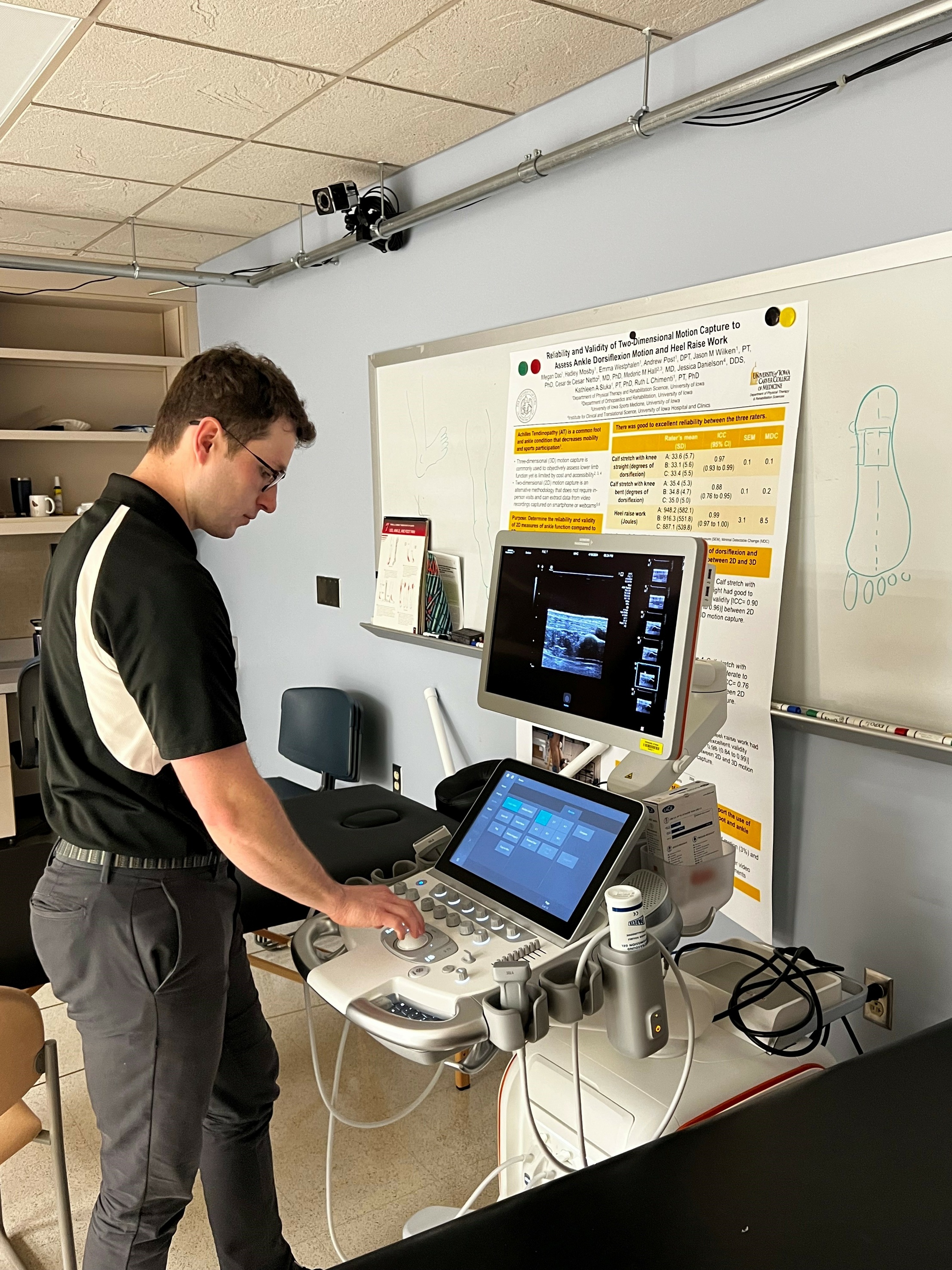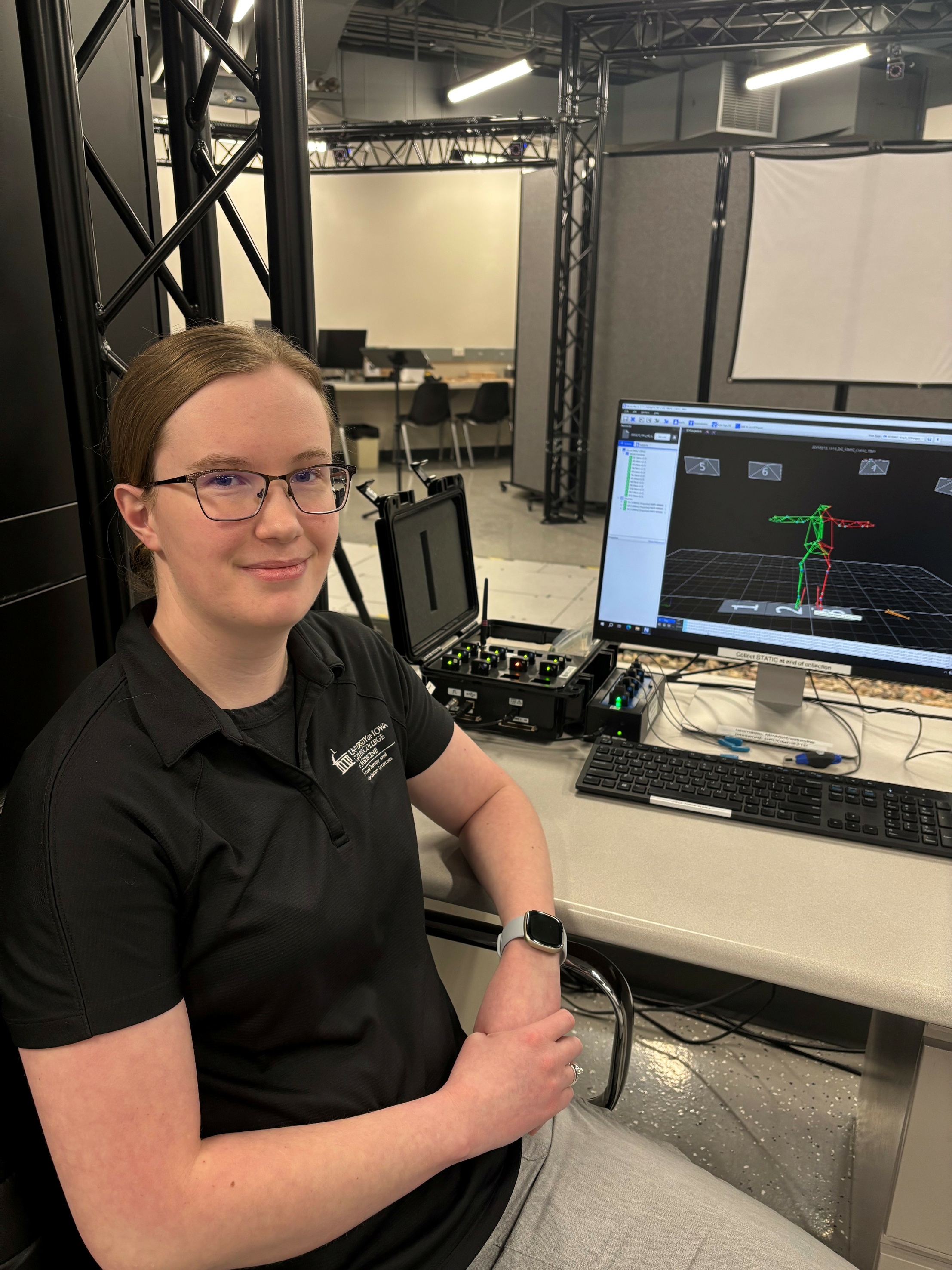Main navigation

Meet PhD Student Tim Fleagle
What is your hometown?
Coralville, IA
What is your educational background?
I have a BA in Biology from Wartburg College and a Doctorate in Physical Therapy from the University of Iowa.
What interested you to pursue a PhD in rehabilitation science?
My interest in pursuing a PhD in rehabilitation science stems from my clinical experiences as a physical therapist. The wide variability in clinical outcomes highlighted the need to better understand why patients develop musculoskeletal pain conditions and create more personalized treatment options for them. Before starting my DPT I had the opportunity to work on research projects in various capacities and fell in love with the research process. The combination of clinical questions and enjoying research are what got me excited enough to pursue a PhD.
Is there a teacher or mentor who helped you decide on this career path?
I have been fortunate to have multiple mentors who influenced my decision to pursue this career path. Before starting PT school, I worked for Darren Hoffmann, PhD, who is faculty in the Anatomy and Cell Biology Department. Under his mentorship, my research interested started to grow. During PT school at Iowa, my advisor was Kathleen Sluka, PT, PhD. While working with her lab, I realized that PT research was something I wanted to pursue as a career.
How or why did you choose the University of Iowa for your education?
The University of Iowa Department of Physical Therapy and Rehabilitation Science has a tremendous history of educating leaders in PT research. I also had many positive experiences working with faculty in the department as a student and as a clinician. When I started exploring where to complete a PhD, the University of Iowa was at the top of my list. I was fortunate enough to find my mentor, Ruth Chimenti, PT, PhD, who had similar research interests and more importantly, who takes the time to proactively provide mentorship that contributes towards my training as an independent researcher.
What are your career objectives?
Ultimately, my objective is to become an independent clinical researcher. I also want to serve the physical therapy profession through teaching and mentoring the next generation of clinicians and researchers.
What are some of your outside interests?
Outside of coursework, research, and teaching, I try and spend as much time as possible with my wife and two sons. I also enjoy spending as much time outside as possible running or cycling.
What one piece of advice would you give to a prospective student?
The PhD process is very rewarding but it is long and at times very difficult. It is really important to make sure you find a supportive training environment including the right university, department, and advisor to make sure you are able to meet your own career goals.
Why would you recommend students to apply to the PhD program in Rehabilitation Science at the University of Iowa?
The research training and mentorship you will receive in the Department of Physical Therapy and Rehabilitation Science is second to none. Additionally, the Carver College of Medicine provides incredible amounts of support and resources to trainees. Iowa City is both a big small city and a small big city. It is a fantastic place to live and offers fantastic access to outdoor recreation, the arts, and a high quality of life.

Meet Recent PhD Graduate Kirsten Anderson
What is your hometown?
Plainfield, IL
What is your educational background?
Bachelor of Science in Biomedical Engineering
What interested you to pursue a PhD in rehabilitation science?
I have been interested in pursuing a career related to prosthetics and orthotics since high school. I had the opportunity to shadow in a local prosthetics and orthotics clinic and work in a research lab studying carbon fiber custom dynamic orthoses. These experiences helped me realize that I enjoy the research aspect of studying the impact that prosthetics and orthotic devices can have on patient outcomes. This led me to pursue a PhD in rehabilitation science.
Is there a teacher or mentor who helped you decide on this career path?
I had the opportunity to work in Dr. Wilken's research lab during my undergraduate studies which was my first experience in research and started my interest in applying to grad school. I also had the opportunity to talk to some of my engineering professors who had followed a similar path, which helped me understand what pursuing a PhD would entail and what opportunities that it may bring in the future.
How or why did you choose the University of Iowa for your education?
When looking into the University of Iowa I appreciated the fact that this program is known for conducting high quality research, and that students have the opportunity to be so involved in that process. Completing my undergraduate degree at the University of Iowa also gave me good insight into what student life is like on campus, so I had an idea of what to expect during grad school.
What are your career objectives?
After graduation I would like to pursue a post-doc position and then continue my career in academia in either a faculty or research position.
What are some of your outside interests?
I usually bounce between a few hobbies at a time. My husband, my siblings, and I have weekly game nights together which is a nice way to step away from school. I usually have some sort of sewing or quilting project going at any time and I love the opportunity to get outside whenever the weather is nice.
What one piece of advice would you give to a prospective student?
One piece of advice I would give prospective students is to research the labs you are considering. Look into their ongoing research, read about what thye have already published, and try to find something that aligns with your interests.
Why would you recommend students apply to the PhD program in Rehabilitation Science at the University of Iowa?
I would recommend that students apply to the Rehabilitation Science Program because this department offers the opportunity to be a part of high-quality research. It's been an incredible experience to work on the projects I've been involved with, and it's really rewarding to see the impact this work can have on patient outcomes and hear about how it can change someone's life.